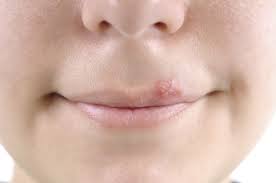Cold sores may seem harmless, but they can move even the toughest of us to tears. If you’ve ever had a cold sore, you understand why — one little blister can pack a lot of pain. And because cold sores herpes are so contagious, it’s hard not feel like a pariah when you have an outbreak. But frustrating as a herpes cold sore is, you can find some comfort knowing that more than half the human population is in the same boat. The Herpes Virus Association estimates that 6 out of 10 people carry HSV-1 – the virus that causes cold sores herpes above the waist (commonly appearing on the face or lips).
According to Simple Steps Dental, most people get the cold sore virus before age 10. Cold sores are transmitted through saliva (via kissing, sharing towels, etc.). Oral herpes cold sore outbreaks can last a week or more and generally evolve over five stages: the tingle stage (days 1-2), the blister stage (days 2-3), the ulcer stage (day 4), the crusting stage (days 5-8) and the healing stage (day 8 and beyond).
Once you get cold sores herpes, there’s no getting rid of them. But there are some things you can do to minimize cold sore outbreaks and prevent them from spreading — either to someone else or somewhere else on your body.
Minimizing Cold Sore Outbreaks
Few people realize this, but you can turn to a dentist for help if you have an oral herpes cold sore problem. A dentist can diagnose cold sores herpes through a visual exam and review of your medical history. Your family physician may also want to conduct other tests to diagnose cold sores if you have other health conditions.
A dentist or physician can prescribe medications to minimize cold sore outbreaks. The most common medication is acyclovir (Zovirax), an antiviral medication that can shorten how long you have cold sores herpes. Available in cream and ointment form, Zovirax can be applied to a herpes cold sore at any stage of an outbreak.
Other cold sore therapies can be found in natural, homeopathic or Eastern medicine. The following may help inhibit the herpes simplex virus: lysine supplements (lysine is found in red meat, fish and eggs); lemon balm cream; reishi supplements (derived from the Ganoderma lucidum mushroom); and Resveratrol cream (derived from grapes). Get professional advice before trying these.
Living a healthy lifestyle can also help reduce the number of herpes cold sore episodes you have. Your dentist or physician may recommend that you:
Reduce stress. Stress is one of the most common triggers of cold sores herpes. Try stress-reducing activities like meditation or yoga.
Use sun protection. Products with SPF15 or more can help shield you not only from sun damage and skin cancer but also from cold sore outbreaks.
Boost your immunity. Consider taking a multivitamin or extra Vitamin C to build your resistance to fevers, colds and the flu, which can trigger cold sores herpes.
Cold sores can also be triggered by menstruation and trauma to the lips or mouth.
How to Avoid Spreading Cold Sores
The fact that cold sores are so contagious means it’s important to avoid skin-to-skin contact whenever blisters are present. In addition, care should be taken not to share towels, drinks, utensils or any item that is likely to touch your mouth or lips. Finally, keeping your hands clean and refraining from touching your face as much as possible can help prevent sores from spreading to other parts of your face or body.
Keeping Cold Sores to Yourself
Know that sinking feeling you get when you look in the mirror and see a cold sore? That’s exactly how your friend or loved one will feel if you’re not extremely careful during an outbreak. So it’s crucial that you don’t downplay how contagious cold sores are and avoid kissing, sharing utensils, towels or lip products for at least 48 hours after all signs of cold sores herpes have disappeared. Be careful about handling your toothbrush, too; if you place it on the edge of a toothpaste tube, you could inadvertently spread the virus that way. Change your toothbrush after every herpes cold sore episode. Finally, wash your hands religiously — especially after applying ointment to cold sores. This way you’ll avoid spreading HSV-1 to others and to other parts of your body.
Cold sores can be exasperating, but they can be reduced to a slight bother with just one visit to a dentist.

